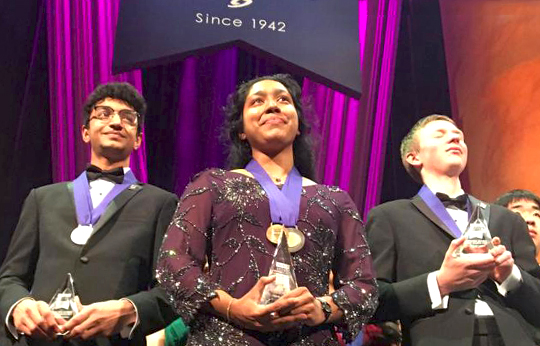Washington, Mar 16: An Indian-American teen has won the top award, worth USD 250,000, in the oldest and most prestigious science and math competition in the US, for her research on preventing death of neurons due to brain injuries or neurodegenerative diseases.

Indrani Das, a 17-year-old resident of New Jersey, and four other Indian-origin students were among the top ten finalists to be honoured at the annual Regeneron Science Talent Search Awards Gala for their research projects demonstrating exceptional scientific and mathematical ability.
Forty finalists took home more than USD 1.8 million in awards.A contributor to neuron death is astrogliosis, a condition that occurs when cells called astrocytes react to injury by growing, dividing and reducing their uptake of glutamate, which in excess is toxic to neurons.
In a laboratory model, Das showed that exosomes isolated from astrocytes transfected with microRNA-124a both improved astrocyte uptake of glutamate and increased neuron survival.
Arjun Ramani, an 18-year-old student from Indiana won the third place honours worth USD 150,000 for blending the mathematical field of graph theory with computer programming to answer questions about networks.
Typically, these questions require statistical comparisons to hundreds or thousands of random graphs, a process that can take a relatively long time.
He developed an algorithm that greatly accelerated the process by reducing the time required to generate these graphs.
"Congratulations to the Regeneron Science Talent Search 2017 top winners," said George D Yancopoulos, President and Chief Scientific Officer of Regeneron.
"My experience as a Science Talent Search winner led me to embark on a career in science, and I hope it will inspire these exceptional young scientists to become the next generation of innovators that will improve the world and solve some of our most pressing challenges as a society," said Yancopoulos.
Archana Verma, 17, from New York, received a USD 90,000 award for her study of the molecular orbital energy dynamics of dyes, which may someday result in windows that produce solar energy.
Prathik Naidu, 18, from Virginia, received a USD 70,000 award for his creation of a new machine learning software to study 3D interactions of the human genome in cancer.
Vrinda Madan, 17, from Florida, received a USD 50,000 award for her study of 24 potential compounds for the treatment of malaria, in which she found two potential candidates that appear to target the disease-causing organism in a novel way and may warrant further study.
Of more than 1,700 high school seniors who entered the Regeneron Science Talent Search 2017, roughly 300 were named scholars in January.
Of those scholars, 40 students were named finalists and invited to Washington, DC to compete for the top 10 awards.





Comments
Add new comment